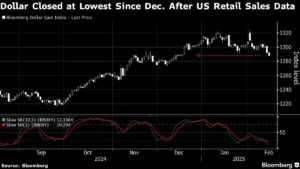European Bonds Slide as Defense Stocks Surge Amid Rising Military Spending
In a significant market shift, European bonds have seen a notable decline, while shares in defense companies have rallied sharply. This trend is largely attributed to the anticipation of increased military spending across Europe, which is expected to lead governments to ramp up borrowing over the coming years.
Bond Markets React
Recent data reveals that prices for German, French, and Italian bonds have all dipped, with the yield on 10-year bunds—the euro area’s benchmark borrowing rate—reaching its highest point in over two weeks. As bond prices fell, Europe’s Stoxx 600 index continued its upward trajectory, gaining 0.5%. Meanwhile, a Goldman Sachs index tracking European defense stocks hit a record high, driven by heightened geopolitical tensions and the need for enhanced military readiness.
One notable performer in this sector is the German defense firm Rheinmetall AG, which surged 14%, helping propel the Frankfurt Stock Exchange to its 17th record high this year. While US markets were closed for the Presidents Day holiday, US equity futures nonetheless climbed, signaling optimism in the broader market. However, cryptocurrencies experienced a downturn, with Bitcoin falling as much as 1.9%.
Escalating Global Tensions
The uptick in defense spending comes on the heels of the US urging European nations to clarify their security capabilities and obligations to Ukraine. As European officials convene to devise a comprehensive response, it is becoming increasingly clear that the continent may need to assume greater responsibility for its security.
Aneeka Gupta, head of macro research at Wisdomtree UK Ltd, commented, “The goalposts are shifting, and the EU is realizing they can rely less and less on the US for protecting their borders. In lockstep, we’re going to have to see European countries spend more on defense, which warrants more caution on bonds.”
Bloomberg Economics estimates that the costs associated with upgrading defenses and securing a lasting peace deal between Ukraine and Russia could amount to an additional $3.1 trillion over the next decade. This potential burden has fueled speculation that debt issuance will have to increase to finance these efforts, with discussions of issuing joint EU bonds amidst divisions among member states.
Broader Market Implications
On a more positive note, European stocks are also receiving a boost from developments in China, a critical export market for many companies. Recent talks between President Xi Jinping and business leaders, including Alibaba co-founder Jack Ma, have stirred hopes that the lengthy crackdown on the private sector in China may be coming to an end.
In the currency markets, the Japanese yen strengthened against all major currencies, buoyed by stronger-than-expected economic growth, which has heightened anticipation of interest rate hikes from the Bank of Japan.
As we navigate these turbulent waters, here are some key economic events to watch this week:
- US Markets Close: Presidents Day holiday (Monday).
- Australia Rate Decision: Tuesday.
- Bank of England Governor Speaks: Tuesday.
- US FOMC Minutes Release: Wednesday.
- G-20 Foreign Ministers Meeting: Thursday-Friday.
Market Movements at a Glance
As we look at market performance:
- Stocks:
- S&P 500 futures increased by 0.2%, reaching their highest level since January 23.
- MSCI World Index remained relatively unchanged.
- Currencies:
- The euro saw a slight dip of 0.1% against the dollar.
- The British pound increased by 0.3%, marking its highest rate since December.
- Cryptocurrencies:
- Bitcoin experienced a notable decline of nearly 1.8%.
- Ether increased by 1% to $2,715.38.
Conclusion
In the coming months, the interplay between military spending, currency fluctuations, and market dynamics will be critical for investors. As Europe pivots towards self-reliance in defense, the implications for economic strategies, debt issuance, and stock performances will be profound. Stay informed as we unpack these developments and their impact on investment strategies at Extreme Investor Network.

